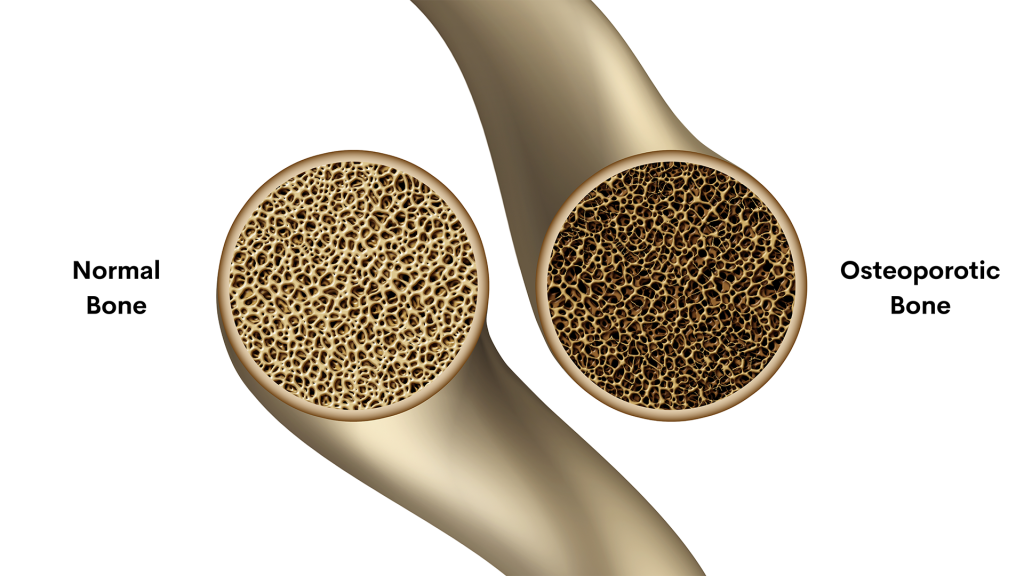The endocrine system, a network of glands and organs, plays a crucial role in maintaining the body’s internal balance by producing, storing, and secreting hormones. These hormones are essential for bone health and strength. An imbalance—whether an excess or deficiency—of certain hormones can lead to conditions such as osteopenia and osteoporosis. These conditions weaken bones, making them more susceptible to fractures and breaks.
Understanding Osteoporosis

Osteoporosis, derived from the Greek words for ‘porous bones’ is a progressive condition where bones become fragile and more prone to fractures. Osteopenia, a precursor to osteoporosis, is characterized by a less severe decline in bone mass. During childhood and early adulthood, bone turnover—the balance of bone loss and formation—is typically well-regulated. Bone mass increases during these years. However, as one ages, particularly after mid-life, bone breakdown outpaces bone formation, leading to a gradual decline in bone mass.
Risk Factors for Osteoporosis
Uncontrollable (Risk factors that you cannot change) Risk Factors:
- Older age
- Female gender
- Menopause
- Family history of osteoporosis
- Low body weight (small and thin physique)
- Certain ethnicities have a higher risk of osteoporosis (e.g., Caucasian or Asian ethnicity)
- Certain diseases may weaken bones and increase the risk of osteoporosis and fractures. Examples include rheumatoid arthritis, diabetes, malabsorption, chronic kidney disease and many others.
Controllable (Risk factors that you can potentially change) Risk Factors:
- Low calcium diet
- Inadequate sun exposure leading to vitamin D deficiency
- Sedentary lifestyle
- Cigarette smoking
- Excessive alcohol consumption of more than 2 units of alcohol per day
- Significant weight loss
- Certain medications, in particular, long-term use of steroids, also elevate the risk of
developing osteoporosis.
Treatment and Prevention
To manage osteoporosis, a combination of lifestyle changes, preventive measures, and medications may be necessary. Treatment options for osteoporosis have increased in recent years and the type of treatment will depend on individual characteristics and risk profile.

Preventive Measures:
- Ensure adequate intake of calcium and vitamin D through diet or supplements (1,000-1,200mg of calcium and 400-800 IU of vitamin D daily for those under 50; 800-1,000 IU for those over 50)
- Engage in weight-bearing exercises and maintain physical fitness
- Avoid smoking
- Limit alcohol consumption
The Impact of Hormones on Bone Health
Hormones significantly influence bone health, and several conditions and treatments can disrupt this
balance:
- Menopause: During menopause, the ovaries produce less estrogen, which diminishes the hormone’s bone-protective effects.
- Aging in Men: As men age, testosterone levels may decline, which can contribute to bone loss.
- Pituitary or Adrenal Gland Tumours: Certain tumours lead to excess cortisol production and Cushing’s syndrome, which accelerates bone loss.
- Corticosteroid Medications: Long-term use of steroids like prednisolone, dexamethasone and hydrocortisone negatively impacts bone health.
- Other Hormone Imbalances: Conditions such as an overactive thyroid gland and hyperprolactinemia (excess prolactin production by the pituitary gland) can also lead to bone loss.
- Thyroid Cancer and Hypothyroidism: Treatments for these conditions often involve high doses of thyroid hormone, which can affect bone mineral density.
- Eating Disorders: Disorders that lower sex hormone production can lead to significant bone loss and an increased risk of osteoporosis.
Maintaining hormonal balance is vital for bone health. Regular check-ups and discussing anyb concerns with your healthcare provider can help mitigate the risks associated with hormonal imbalances. By understanding and managing these factors, you can take proactive steps to maintain strong and healthy bones throughout your life.
Take Action with Osteoporosis Screening

If you are concerned about your bone health or have risk factors for osteoporosis, consider scheduling an osteoporosis screening. Our comprehensive screening process is designed to assess your bone health with a bone mineral density (BMD) test and identify any underlying conditions that may contribute to osteoporosis with blood tests. By thoroughly investigating all potential secondary causes, we can provide you with a detailed understanding of your bone health and the best strategies to maintain or improve it.
Schedule your osteoporosis screening today to take the first step toward stronger, healthier bones.

